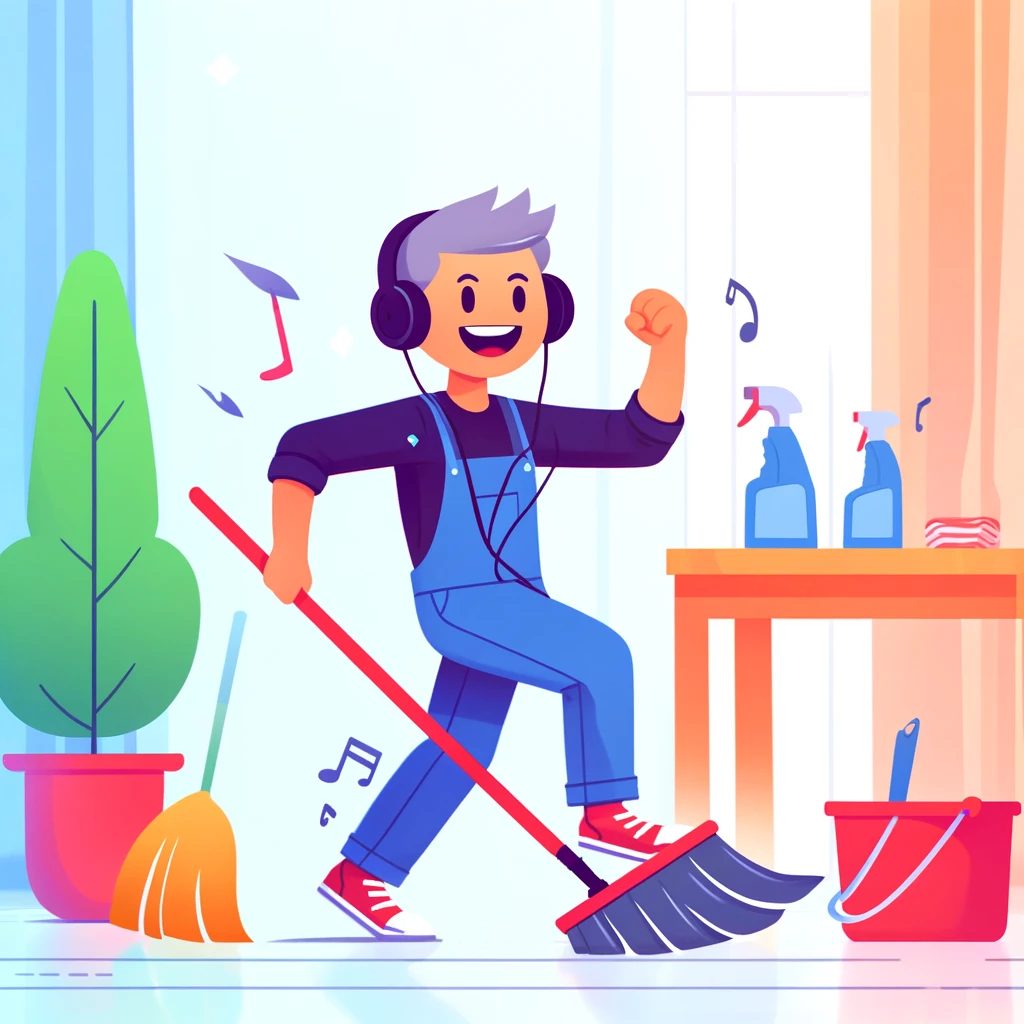How to Combine Home Cleaning and Exercise: 5 Ways to Stay Fit While You Tidy
Keeping your home sparkling doesn’t just have to be about chores—it can also be a great way to sneak in some exercise! If you’re looking to kill two birds with one stone, here are five ways to stay fit while you tidy up your space. This guide will show you how to transform routine home cleaning and exercise into a dynamic duo that boosts your fitness and freshness at home. 1. Vacuum Power Walks Combining home cleaning and exercise can turn mundane tasks into an energetic fitness routine, starting with your vacuum cleaner. When it’s time to clean your floors, think of your vacuum not just as a cleaning tool, but as a partner in your workout. To get started, pull on a comfortable pair of sneakers to give you good support and grip, which is especially useful if you’re moving quickly or have slippery surfaces. Transform your vacuuming into a calorie-burning power walk by maintaining a brisk pace throughout your home. As you push your vacuum forward and pull it back, you’re mimicking the push-pull dynamics often found in gym workouts, which can be particularly effective for your arms and shoulders. To enhance this workout, ensure that you’re engaging your core muscles as you move, keeping your posture straight and stable. This helps in turning a simple vacuum session into a full-body workout. For those looking to add a bit more intensity, integrating lunges into your routine can significantly boost the exercise benefits. Every few steps, perform a lunge by stepping forward with one leg and bending your knees to lower your hips. This not only targets your glutes and quads but also adds a dynamic movement that increases your overall energy expenditure. It’s crucial, however, to keep your back straight and your knees in line with your toes to avoid any strain or injury. Switching arms halfway through your vacuuming also ensures that you work out both sides of your body equally. This not only helps in building arm strength but also keeps your muscles balanced and engaged throughout the cleaning session. 2. Dish Dancer Turning dishwashing into a dynamic part of your home cleaning and exercise routine can transform this often tedious task into a lively and enjoyable activity. The concept of the ‘Dish Dancer’ is all about adding a burst of energy and fun to the sink-side. Instead of standing still, why not groove to the rhythm of your favorite songs? Begin by creating a playlist of upbeat tracks that uplift your spirit. Music has the power to motivate and energize, making it the perfect companion for household chores. As you load up the soap and start scrubbing, let the music take over and guide your movements. Sway gently from side to side, twist your hips, or even throw in a few shimmy shakes. These dance moves aren’t just fun; they’re also a great way to engage different muscle groups, increase your heart rate, and enhance your flexibility. Dancing while doing the dishes serves multiple health benefits. The continuous movement helps improve circulation and can burn more calories compared to standing still. Flexibility and range of motion can also see improvements as you reach, bend, and twist. Additionally, the mental benefits are significant. Dancing naturally elevates your mood, thanks to the release of endorphins, making you feel more positive and energized. This psychological boost is a wonderful side effect of integrating dancing into your dishwashing routine, making the chore feel more like a pleasure than a task. 3. Staircase Circuits Integrating staircase circuits into your home cleaning and exercise regimen is a fantastic way to make the most out of the architectural features in your home. If you’re lucky enough to have stairs, you possess a versatile, effective tool for enhancing both your fitness and your home’s cleanliness. To start, setting a timer for 15 to 20 minutes can help you stay focused and motivated. This timed approach turns your stair climbing into a more structured workout session. As you engage in cleaning tasks that involve stairs—like carrying laundry baskets or moving items from one floor to another—you’re not just tidying up; you’re also engaging in a rigorous physical activity that elevates your heart rate and strengthens your muscles, particularly in your legs and core. To add variety and increase the intensity of your workout, consider changing your movements every few trips. You might run up the stairs to boost cardiovascular intensity or add a hop on each step to challenge your balance and power. For those looking to increase muscle engagement, taking two steps at a time can be especially effective, as it requires more force and engages more muscle groups, particularly the glutes and thighs. These variations not only keep the workout interesting but also ensure that different muscle groups are targeted, which can lead to better overall fitness gains. Moreover, the act of balancing and moving quickly can improve coordination and agility, which are beneficial for overall body mechanics. 4. Counter-Top Push-Ups Incorporating counter-top push-ups into your home cleaning and exercise routine is a clever way to use every minute effectively, especially during those inevitable waiting periods in the kitchen. Whether it’s waiting for the kettle to boil, the microwave to beep, or the oven to preheat, these moments provide the perfect opportunity to sneak in some physical activity. Positioning yourself a few feet away from the counter, ensure your feet are firmly planted and your body is in a straight line. By placing your hands on the edge of the counter, you can perform push-ups that are slightly easier than floor versions but still incredibly effective for targeting the muscles in your chest and arms. This exercise not only helps in building upper body strength but also engages your core as you maintain a stable posture. Counter-top push-ups are an excellent exercise to integrate into your home cleaning and exercise schedule because they can be done quickly and do not require any additional equipment. This makes them an accessible
How to Combine Home Cleaning and Exercise: 5 Ways to Stay Fit While You Tidy Read More »

